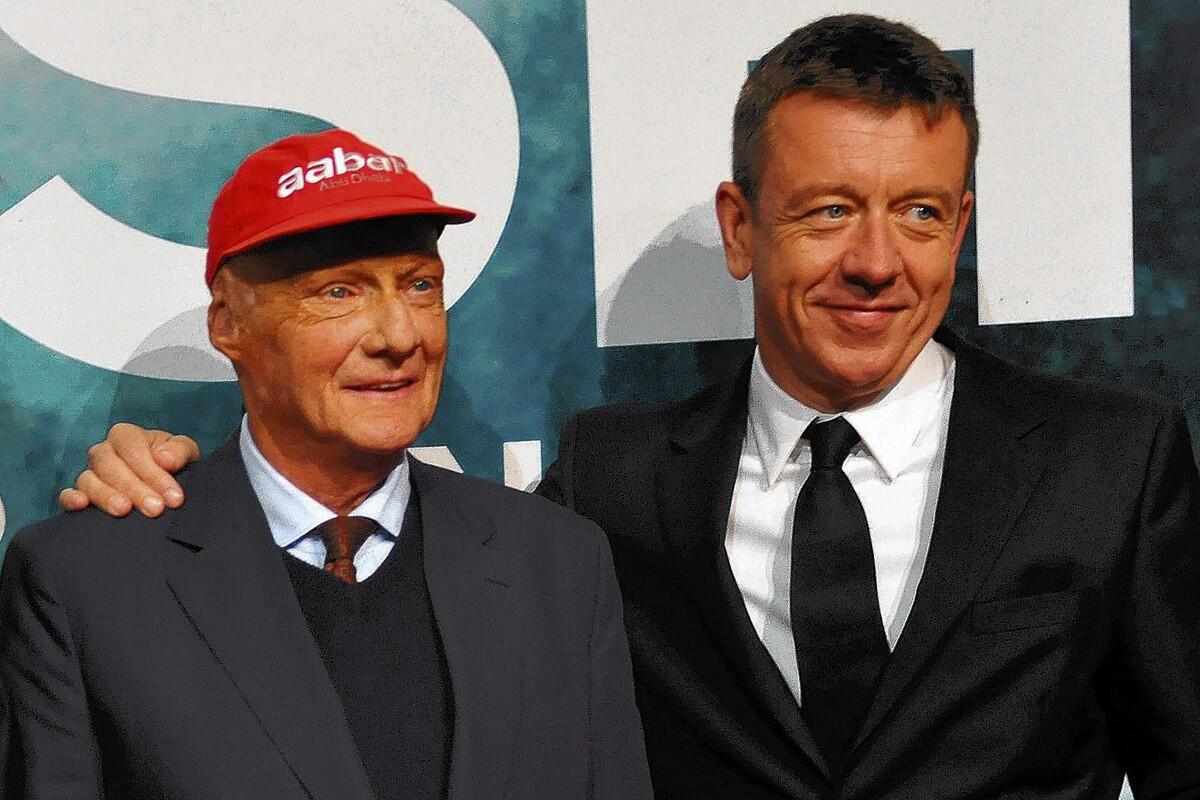Peter Morgan on the drive to write ‘Rush’

- Share via
I should declare I have never been a fan of motor racing. I don’t watch Formula One, the intricacies of engine refinement and lap times leave me cold, I don’t even drive fast. So how come “Rush” ended up being an unusually personal screenplay to me?
The answer is that the two racers at the heart of the story, James Hunt and Niki Lauda, represent in some way two halves of me. I was born the son of immigrant Germans and was brought up in the UK, teased as “a Kraut.” Jump forward 20 years, and I married an Austrian and live in Vienna, where now I am known as “a Brit.” I guess I’m saying I feel uniquely qualified to write about the rivalry between an Austrian and a Brit.
Further, Niki and James are/were men I could identify with, that both conducted their lives and their careers in ways that made sense to me. As archetypes for a drama, both men spoke to me. Perhaps more importantly, as a writer, I felt I could speak for them too. Sometimes you have the good fortune to stumble upon characters whose voices you just — hear.
FULL COVERAGE: Oscars 2014
I was introduced to Niki Lauda by my wife in 2009. It was the summer, we were both on holiday. In Ibiza. Niki came for lunch. We got talking about who knows what, having young kids, which part of the island is best to live in, the heat probably. But I was mesmerized by the way he talked. His syntax. The abruptness. The lack of frills. I just heard his voice.
After Niki left, I went on the Internet, his voice and very particular sentence constructions still ringing in my ears, and I realized straightaway I could write him. I read about him and became familiar with his three world championship victories and, even more so, the terrible accident he endured in 1976. And his comeback. And the extraordinary events of that season.
Couple of days later, I asked my wife to invite him again. This time I asked him if he’d be interested in letting me write his story. He agreed — even after I’d told him the conditions: that he would never see a page I’d written, that he’d have no control, that he would hate how I portrayed him. People (and I count myself in this number) generally cannot handle an un-Photoshopped version of themselves, but our faults are often the most attractive sides of ourselves. I also broke it to him that the film would not just be about him. He’d have to play a supporting role to his archrival — James Hunt.
TIMELINE: The Academy Awards through the years
A word here about James Hunt. He was a rock star sportsman. Controversial, sexy, wild. Uncommonly handsome. Half Bond, half Jagger. I was a 13-year-old boy when James won the world championship, and if you’d asked me what or who I’d most wanted to be at that age, I’d have said, “I want to be him.” Tragically, he lost his life at age 45 because of a heart attack, so I was never going to have the benefit of firsthand research, but first Niki and then James’ family and colleagues were able to fill in a lot of the gaps from his perspective.
Soon, I had all the facts I needed, and the encouragement of directors Paul Greengrass and Ron Howard, both of whom told me I absolutely had to write it next. The only thing that eluded me was a structure.
In the end, I settled on structuring it as a race itself. I imagined the movie as one big grand prix, with Hunt and Lauda taking turns to pass one another. The screenplay is constructed as a series of overtaking maneuvers. James overtakes Niki. Inspired, Niki fights back, overtakes James, and so on. It had the effect of making the tempo propulsive but also of having the structure become the meaning itself.
VIDEO: Highlights from the Envelope Screening Series
Two very different men, rivals, rebels and outcasts, overtaking one another, passing one another, and finding very different paths — and in so doing helping one another to reach individual greatness. What felt fresh was that rivalry was inverted respect, that enemies were dependent on one another. That rivalry and enmity are different ways of expressing respect and love. These were themes I remember “Merry Christmas Mr. Lawrence” exploring so imaginatively.
Jump forward 18 months, and Niki and I meet after the film has played at the Toronto festival, and Niki says, “Please explain something to me. How is it that you write me like a total [jerk], rude and cold and arrogant and objectionable, and now everyone comes up to me and tells me that they love me?”
MORE OSCAR COVERAGE
WINNING BALLOT: A list of the 2013 winners
PHOTOS: Best & worst moments
TIMELINE: Academy Awards through the years
More to Read
Sign up for The Envelope
Get exclusive awards season news, in-depth interviews and columnist Glenn Whipp’s must-read analysis straight to your inbox.
You may occasionally receive promotional content from the Los Angeles Times.










